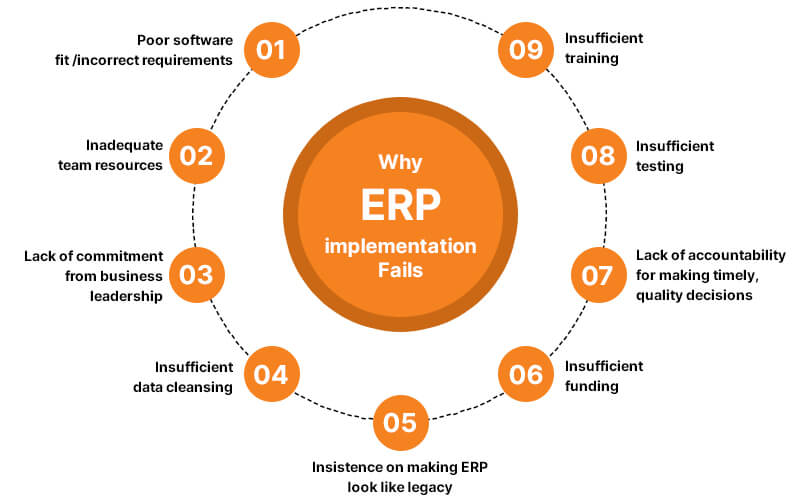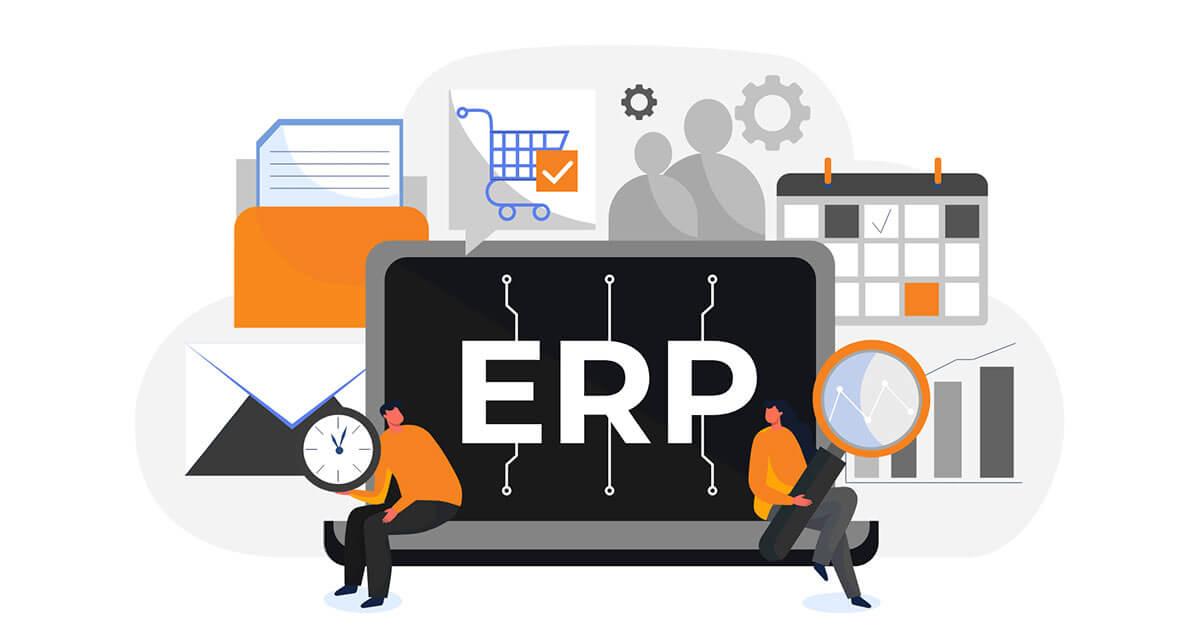Enterprise Resource Planning (ERP) systems are designed to streamline business operations and help enterprises achieve their goals. ERP implementation projects can be complex and expensive, involving changes to business processes, data migration, and employee training. However, despite the potential benefits, ERP implementation failure is common.
In fact, according to studies, the failure rate for ERP implementations can be as high as 50%.
The consequences of ERP implementation failure can be severe, including lost productivity, wasted resources, and damage to the organization’s reputation. In this article, we will explore the top 9 causes of ERP implementation failure and strategies for avoiding these pitfalls and ensuring a successful ERP implementation project.
Top 9 Causes of ERP Implementation Failure with Solutions

1. Poor software fit /incorrect requirements
One of the most common causes of ERP implementation failure is poor software fit or inaccurate requirements. While customization may seem like a viable solution to meet unique business requirements, it can be a double-edged sword. Customizing the software can make upgrading, maintaining, and supporting easier, leading to higher costs and longer project timelines. Additionally, customization can increase the risk of errors and bugs in the software, making it harder to diagnose and resolve issues.
Solution:
To avoid customization-related ERP implementation failure, companies should weigh the benefits of customization against the potential costs and risks. They should explore alternative solutions, such as process redesign or using add-ons, that can meet their needs without needing customization. If customization is deemed necessary, companies should consider the long-term implications carefully and ensure they have the resources and expertise to maintain and support the customized software.
2. Inadequate team resources
Insufficient team resources are another significant cause of ERP implementation failure. Implementing an ERP system requires a multidisciplinary team with expertise in project management, business analysis, software development, testing, and training. Often, companies need to pay more attention to the time, effort, and resources required for an ERP implementation, leading to inadequate staffing and budget allocation.
Solution:
Enterprises should allocate adequate staffing and budget to the project to ensure adequate team resources are sufficient for an ERP implementation. They should identify key team members and ensure they have the skills and experience to execute the project successfully. Additionally, companies should establish clear communication channels and expectations, including roles and responsibilities, to keep the team members accountable and motivated. Enterprises can ensure that their ERP implementation stays on track and meets the project objectives by having the right resources.
3. Lack of commitment from business leadership
Another cause of ERP implementation failure is a need for more investment in change management. Implementing an ERP system involves significant changes in business processes, organizational structure, and employee roles and responsibilities. Without proper change management, employees may not understand and resist the changes, leading to a lack of adoption and use of the new system.
Solution:
Enterprises should prioritize change management from derailing an ERP implementation to prevent a lack of investment in change management. They should allocate the necessary resources, including staffing, training, and support, to ensure that employees are prepared for the changes that come with the new system. Additionally, enterprises should communicate the importance of change management to the project’s success and ensure that change management activities are integrated into the overall project plan. By investing in change management, enterprises can ensure that their ERP implementation is successful and employees are prepared for the changes that come with the new system.
4. Insufficient data cleansing
Insufficient data cleansing is another common cause of ERP implementation failure. ERP systems rely on accurate and reliable data to operate effectively. The system may only function correctly when the data is incomplete and consistent, leading to errors, delays, and other issues.
Solution:
Enterprises should prioritize data cleansing from the outset to ensure sufficient data cleansing from derailing an ERP implementation. They should allocate the necessary resources, including staffing and tools, to ensure that data is cleansed accurately and completely. Additionally, enterprises should establish clear data cleansing procedures and protocols and ensure that team members are trained on these procedures. By prioritizing data cleansing, enterprises can ensure that their ERP system operates effectively and that data is accurate and reliable.
5. Insistence on making ERP look like legacy
Insisting on making an ERP system look like legacy systems is another significant cause of implementation failure. ERP systems are designed to be highly configurable and flexible, allowing enterprises to customize the system to meet their specific business needs. However, some enterprises may insist on making the new system look and operate like their old, legacy systems, which can lead to significant challenges and complications.
Solution:
To prevent insistence on making ERP look like a legacy from derailing an ERP implementation, enterprises should focus on the benefits and capabilities of the new system. They should work with the implementation team to understand the system’s functionality and how it can be customized to meet their business needs. Additionally, enterprises should prioritize user training and communication to ensure that employees understand the benefits and capabilities of the new system. By embracing the new system’s flexibility and capabilities, enterprises can ensure that their ERP implementation is successful and meets their business needs.
[Also Read: Envision a Cautious Start for Successful ERP Implementation]
6. Insufficient funding
Insufficient funding is also a common cause of ERP implementation failure. Implementing an ERP system can be expensive, with software licensing, hardware, infrastructure, customization, and training costs. An organization must allocate sufficient funding to the implementation process, adequate resources, and complete implementation.
Solution:
Enterprises should develop a comprehensive budget for the project to ensure sufficient funding from derailing an ERP implementation, including all associated costs. They should also be prepared to adjust the budget and ensure adequate funding is available throughout the implementation process. By investing in the necessary resources, enterprises can ensure that their ERP implementation is successful and delivers the desired benefits.
7. Lack of accountability for making timely, quality decisions
Lack of accountability in making high-quality decisions is another significant cause of ERP implementation failure. When there is no clear accountability structure for decision-making, it can lead to confusion, delays, and poor decision-making, ultimately derailing the implementation process.
Solution:
To prevent this, enterprises should establish a clear accountability structure for decision-making, including who has the authority to make decisions and who is responsible for implementing them. This can help ensure that decisions are made efficiently and effectively and that the implementation process stays on track.
8. Insufficient testing
Lack of testing is another significant cause of ERP implementation failure. Inadequate testing can result in system errors, data inaccuracies, and other issues undermining the system’s effectiveness and efficiency. It can also lead to costly delays and rework if issues are not identified and addressed promptly.
Solution:
To ensure that an ERP system is thoroughly tested before going live, enterprises should develop a comprehensive testing plan that includes a variety of scenarios and use cases. The testing plan should involve end-users and IT staff and cover all aspects of the system, including data migration, system integration, and customization. Enterprises can increase the chances of a successful ERP implementation by prioritizing testing and addressing issues as they arise.
9. Insufficient training
Insufficient training and support is another common cause of ERP implementation failure. Without proper training and support, end-users may not know how to use the system effectively, leading to data inaccuracies, reduced productivity, and user frustration. It can also result in a lack of adoption and resistance to the new system, ultimately undermining the implementation process.
Solution:
To ensure that end-users are adequately trained and supported, enterprises should develop a comprehensive training plan that includes training for all relevant stakeholders. They should also provide ongoing support during and after the implementation process to address any issues and ensure the system is used effectively. Enterprises can increase user adoption by prioritizing training and support and providing the ERP system that delivers the desired benefits.
Final Thoughts
ERP implementation failure can result from various factors, including poor software fit, insufficient team resources, lack of leadership commitment, lack of accountability and investment in change management, insufficient data cleansing, insistence on making the new system look like the legacy system, and lack of testing. Addressing these factors requires a concerted effort from the organization’s leadership and implementation team to prioritize planning, resources, and communication.
Furthermore, it is crucial to hire skilled ERP developers to ensure a successful ERP implementation. Experienced developers possess the expertise to configure and customize the ERP system to meet the organization’s business needs. They can also provide guidance and support during the implementation process to ensure the system operates effectively and efficiently.
Hire expert developers for successful ERP Implementation.
Request Free Consultation
Summary
Kickstart Your Project With Us!
Popular Posts
CONTACT US
Let's Build Your Agile Team.
Experience Netsmartz for 40 hours - No Cost, No Obligation.
Connect With Us Today!
Please fill out the form or send us an email to







